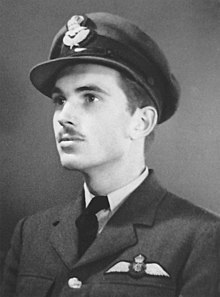John Gillespie Magee Jr.
aviator and poet (1922-1941)
John Gillespie Magee Jr. (9 June 1922 – 11 December 1941) was a Second World War Anglo-American Royal Canadian Air Force fighter pilot and war poet, who wrote the sonnet "High Flight". He was killed in an accidental mid-air collision over England in 1941.

Quotes
edit- We laid him in a cool and shadowed grove
One evening in the dreamy scent of thyme
Where leaves were green, and whispered high above—
A grave as humble as it was sublime;There, dreaming in the fading deeps of light—
The hands that thrilled to touch a woman's hair;
Brown eyes, that loved the Day, and looked on Night,
A soul that found at last its answered Prayer. ...There daylight, as a dust, slips through the trees.
And drifting, gilds the fern around his grave—
Where even now, perhaps, the evening breeze
Steals shyly past the tomb of him who gaveNew sight to blinded eyes; who sometimes wept—
A short time dearly loved; and after,—slept.- "Sonnet to Rupert Brooke" (wr. 1938)
- Oh! I have slipped the surly bonds of Earth
And danced the skies on laughter-silvered wings;
Sunward I’ve climbed, and joined the tumbling mirth
Of sun-split clouds,—and done a hundred things
You have not dreamed of—wheeled and soared and swung
High in the sunlit silence. Hov’ring there,
I’ve chased the shouting wind along, and flung
My eager craft through footless halls of air. ...Up, up the long, delirious, burning blue
I’ve topped the wind-swept heights with easy grace
Where never lark, or even eagle flew—
And, while with silent, lifting mind I’ve trod
The high untrespassed sanctity of space,
—Put out my hand, and touched the face of God.- "High Flight" (wr. 18 August 1941; pub. February 1942), quoted by U.S. President Ronald Reagan on the Space Shuttle Challenger disaster
- (To those who gave their lives to England during the Battle of Britain and left such a shining example to us who follow, these lines are dedicated.)They that have climbed the white mists of the morning;
They that have soared, before the world’s awake,
To herald up their foeman to them, scorning
The thin dawn’s rest their weary folk might take;
Some that have left other mouths to tell the story
Of high, blue battle, quite young limbs that bled,
How they had thundered up the clouds to glory,
Or fallen to an English field stained red.
Because my faltering feet would fail I find them
Laughing beside me, steadying the hand
That seeks their deadly courage—
Yet behind them
The cold light dies in that once brilliant Land. ...
Do these, who help the quickened pulse run slowly,
Whose stern, remembered image cools the brow,
Till the far dawn of Victory, know only
Night’s darkness, and Valhalla’s silence now?- "Per Ardua" (wr. November 1941); cp. Per ardua ad astra ('Through adversity to the stars')